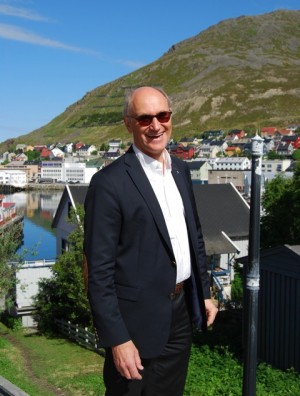Norwegian oil company Statoil isn’t letting the threat of higher offshore taxes interfere with its exploration program in the Barents Sea. Even though it has halted development of its biggest discovery in years, it just drilled its 100th well in the Barents and hopes to find more oil than gas.

Harstad-based Rune Adolfsen, Statoil’s vice president of logistics on northern Norwegian operations, told reporters gathered in Honningsvåg that Statoil remains bullish on the Barents and is especially interested in the area known as Hoop. That’s even farther north of the Skrugard-Havis fields, now renamed Johan Castberg, where Statoil recently made one of the world’s biggest oil and gas discoveries in years.
Statoil announced last week that it had put development of the Skrugard/Castberg field on hold, along with its plans to build a pipeline from the field to a terminal at Veidnes in Honningsvåg township, because of the prospect of higher taxes, higher costs and uncertain resources.
The stocklisted Norwegian oil company that’s still controlled by the state is moving forward, though, with is ambitious exploration program. In addition to eyeing prospects at Hoop, it’s drilling for more oil at Nunatak, around 240 kilometers west of Hammerfest and not far from Skrugard/Castberg.
Statoil officials believe Nunatak could become an extension of Johan Castberg. “There’s a possibility they hang together,” Gro Gunleiksrud Haatvedt, Statoil’s exploration director, told reporters. “A discovery there would be very important for making Johan Castberg more robust.”
Statoil executives like Haatvedt and Adolfsen were busy meeting local politicians and reporters last week, presenting a bullish outlook for the Barents and trying to explain their bosses’ decision to halt development work on Castberg. Speculation is flying that the decision is merely a political tactic, to express Statoil’s profound unhappiness with the Norwegian government’s decision to make a “tax change” on offshore projects. Not so, claims Statoil, arguing along with other oil companies, analysts and professors of economics that higher tax will threaten profits to the point that it may discourage the oil companies from making the huge, long-term investments needed in remote northern waters. Statoil, at least, believes it now needs more time to recalculate whether going ahead with Castberg will, at a higher tax rate be worthwhile in the long run.
Discovery of more adjacent oil can swing the balance, as opposed to gas in a market where gas prices have fallen and don’t justify Barents investment at present. Statoil is also proceeding with drilling projects at the Iskrystall, Skavl and Kramsnø fields near Nunatak. Statoil chief executive Helge Lund had said when the Skrugard discovery was made that the area around it amounted to “a new oil province,” which the company is now tapping.
State and local government officials, meanwhile, are defending the tax change likely to be approved in Parliament next week, possibly with some recalculations to quell the critics. Statoil, argues the Labour Party’s deputy leader Helga Pedersen, “is only looking at the minuses, not the plusses.” She’s from Northern Norway herself and bullish on oil and gas exploration like most others in the Labour Party, but also keen to see the state get its “fair share” of oil profits.
Pedersen, along with Honningsvåg Mayor Kristina Hansen, claims the government intends to introduce some tax relief on oil companies’ onshore installations, for example the planned terminal at Veidnes south of the North Cape. That may offset tax increases offshore.
Views and News from Norway/Nina Berglund
Please support our news service. Readers in Norway can use our donor account. Our international readers can click on our “Donate” button:

